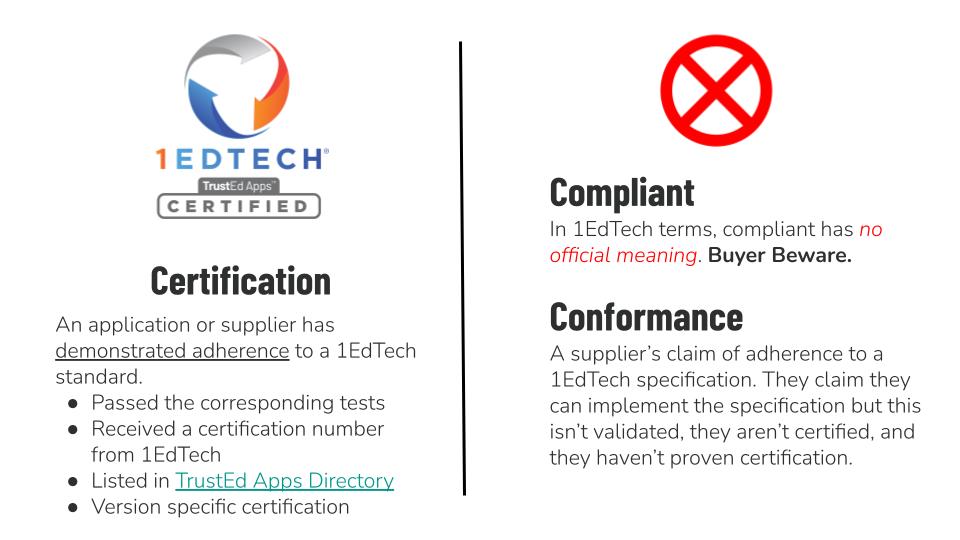1EdTech Glossary

Key terms and vocabulary.
A | B | C | D | E | F | G | H | I | J | K | L | M | N | O | P | Q | R | S | T | U | V | W | X | Y | Z | ALL
C |
|---|
Certified CASE ConsumerAre the suppliers (systems) that ingest CASE API Frameworks. By ingesting CASE frameworks, they can provide CASE-meta tagged resources to districts. CASE consumers can be (1) Education systems, such as an SIS, LMS, assessment platforms, content management systems (CMS) or learning object repositories (LORs), and (2) Curriculum & Assessment Suppliers, digital content providers, learning apps, or learning tools. | |
Certified CASE ProviderThe software or system used to publish CASE Frameworks. CASE providers have to have their API’s certified. Examples: FrostAlign, Standards Satchel, AEFIS, EdGate, and PCG’s OpenSalt. CASE providers can author frameworks, but sometimes the CASE Issuer publishes their competencies or academic standards using a Digital Conversion Tool (see definition below) | |
Client Credential Grant (OAuth 2)This is one of the authorization grant mechanisms defined in the OAuth 2.0 standard (IETF RFC 6749). The client credential grant type is used to obtain both access tokens and refresh tokens and is optimized for confidential clients for which there is exists an established trust relationship. This authorization approach is adopted and adapted in the 1EdTech Security Framework. | |
Common Cartridge® (CC®)
Thin Common Cartridge is a subset of the full Common Cartridge that contains only links and metadata about the content. Today’s digital content comes from a variety of resources making it difficult to integrate. Common Cartridge solves this problem by providing a standard way to package learning content so that it can be exported from one system and imported into another, providing educators and students with greater choice and flexibility to share and reuse content to personalize learning. For more information, see 1EdTech's Common Cartridge Project Group Activity. Learn more about this work: https://www.imsglobal.org/activity/common-cartridge | |
Compatibility Check (CCx)CCx is the software developed and used by 1EdTech to enable the Characterization of products that have already achieved 1EdTech Certification. Characterization is the process by which the interoperability capabilities of a deployed product can be determined. The CCx software produces the characterization reports and is used for the comparison of such reports. It is this comparison which is used to identify the actual interoperability between the two characterized systems. This is the software that is used as a part of the 1EdTech Standards First Program. | |
Competencies and Academic Standards Exchange (CASE)
EdTech suppliers (LMS, SIS, LOR, CMS) use CASE to label and package academic standards.
| |
Competency Framework RubricsInstruments used to identify performance expectations around a task, product or performance. For example, using Bloom’s Taxonomy to determine the depth of learning expected at a grade level. | |
CompliantIn 1EdTech terms, compliant has no official meaning. You should be wary of the use of this in reference to a supplier’s reported implementation of a standard, specifically when there is no certification. Also a product’s claim of conformance, without certification should be discounted. Only certified products have demonstrated adherence to the 1EdTech open interoperability standards. To learn more and get resources on how to procure certified edtech tools, visit: https://www.1edtech.org/certification/procure-certified  | |
Comprehensive Learner Record (CLR)
A CLR is an official document that seeks to capture, record, and communicate learning when and where it happens in a student’s educational experience. This includes learning outcomes from courses, programs and degrees, as well as experience they have outside the classroom that help develop their career ready skills and abilities. Example: Educators designed the CLR to record more context about learning achievements and the learning journey than is possible with a digital badge. Learn more about this work: https://www.imsglobal.org/activity/comprehensive-learner-record | |
